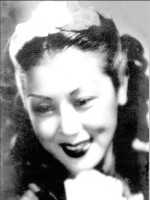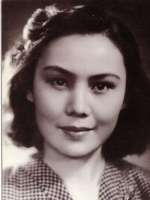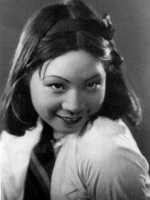Cai Chusheng is a Director and Scriptwriter Chinois born on 12 january 1906 at Shanghai (Chine)

Cai Chusheng (January 12, 1906 – July 15, 1968) was a Chinese film director of the pre-Communist era, and was the first Chinese director to win an international film award at the Moscow International Film Festival. Best known for his progressive output in the 1930s, Cai Chusheng was later severely persecuted and died during the Cultural Revolution. His remains are kept at the Babaoshan Revolutionary Cemetery in Beijing.
Born in Shanghai to Cantonese parents, but raised in Chaoyang, Shantou, Guangdong. Cai only had four years of formal education, and was home-schooled after he had spoken up for his class about the misbehavior of a teacher. While home-schooled, he studied Confucianism and practiced calligraphy and painting. Cai Chusheng initially worked in low-level positions in several small studios during the 1920s, before eventually joining Mingxing Film Company as a director's assistant to Zheng Zhengqiu, another Chaoyang-native. Cai later joined the Lianhua Film Company where he directed a handful of mainstream popular films including Spring in the South and Pink Dream (both 1932). He would not cement his reputation as a leading leftist filmmaker until after the Japanese attack in 1932, when Cai, like many of his colleagues, shifted towards increasingly progressive or leftist filmmaking. This shift can be seen in output after 1932, including the class-struggle dramas Dawn Over the Metropolis (1933), Song of the Fishermen (1934), and the proto-feminist New Women (1934), which starred Ruan Lingyu. Song of the Fishermen, for example, was a major box office success in Shanghai where it played for 87 days, and it would also became the first Chinese film to win an international prize, doing so at the Moscow International Film Festival.
Hong Kong and wartime
During the war, Cai fled first to Hong Kong, where he helped launch Mandarin language cinema with Situ Huimin. In Hong Kong, Cai would also direct two films, including an anti-Japanese thriller. Cai was also a pioneer in making films in local dialects, and the first to make movies in Cantonese. He also made movies in Chaozhou dialect. When Hong Kong fell to the Japanese, Cai fled to Chongqing, China's wartime capital, where he joined the government-run Nationalist Central Film Studio.
Post-war career
Cai's post-war career saw him returning to Shanghai and becoming a leading member of the Lianhua Film Society (later incorporated as the Kunlun Film Company). His collaboration with Zheng Junli The Spring River Flows East (1947) also proved to be a major film and popular success in the brief "Second Golden Age" of Cinema that followed the end of the Second World War. Following the Communist revolution, Cai worked mainly in major government administrative tasks. He also actively involved in promoting Chinese film industry and also formed an organization to monitor the quality of movies and to recognize talented artists in the industry. He did make one major post-1949 film, Waves on the Southern Shore (1963). As the Cultural Revolution began to gain momentum in the late 1960s, Cai Chusheng, like many artists and intellectuals, became the target of persecution. Cai was forced to self-criticize and admit his mistakes in writing. Cai was tortured which had led to his early death in 1968. His ashes are now placed at the Babaoshan Revolutionary Cemetery. The house where Cai spent his youth is now a museum which is designated by the Chinese government as a certified historical attraction. Cai is honored from time to time at major events like the World Expo 2010 and film festivals.
In Stanley Kwan's 1992 biopic of Ruan Lingyu, Center Stage, Cai Chusheng is portrayed by Hong Kong actor Tony Leung Ka Fai. Ruan was one of the Chinese most prominent actress. This film is about Cai's controversial romance with Ruan. Ruan had committed suicide at the age of 24 due to the news media's irresponsible criticism. . Cai condemned the press, which had sparked a ripple effect to raise awareness for responsible conduct in the media. Cai was also very active in promoting the social status and literacy of women--when he had time available, he would teach classes to Chinese women to improve their literacy.
Source : Wikidata
Cai Chusheng

- Infos
- Photos
- Best films
- Family
- Characters
- Awards
Biography
Early careerBorn in Shanghai to Cantonese parents, but raised in Chaoyang, Shantou, Guangdong. Cai only had four years of formal education, and was home-schooled after he had spoken up for his class about the misbehavior of a teacher. While home-schooled, he studied Confucianism and practiced calligraphy and painting. Cai Chusheng initially worked in low-level positions in several small studios during the 1920s, before eventually joining Mingxing Film Company as a director's assistant to Zheng Zhengqiu, another Chaoyang-native. Cai later joined the Lianhua Film Company where he directed a handful of mainstream popular films including Spring in the South and Pink Dream (both 1932). He would not cement his reputation as a leading leftist filmmaker until after the Japanese attack in 1932, when Cai, like many of his colleagues, shifted towards increasingly progressive or leftist filmmaking. This shift can be seen in output after 1932, including the class-struggle dramas Dawn Over the Metropolis (1933), Song of the Fishermen (1934), and the proto-feminist New Women (1934), which starred Ruan Lingyu. Song of the Fishermen, for example, was a major box office success in Shanghai where it played for 87 days, and it would also became the first Chinese film to win an international prize, doing so at the Moscow International Film Festival.
Hong Kong and wartime
During the war, Cai fled first to Hong Kong, where he helped launch Mandarin language cinema with Situ Huimin. In Hong Kong, Cai would also direct two films, including an anti-Japanese thriller. Cai was also a pioneer in making films in local dialects, and the first to make movies in Cantonese. He also made movies in Chaozhou dialect. When Hong Kong fell to the Japanese, Cai fled to Chongqing, China's wartime capital, where he joined the government-run Nationalist Central Film Studio.
Post-war career
Cai's post-war career saw him returning to Shanghai and becoming a leading member of the Lianhua Film Society (later incorporated as the Kunlun Film Company). His collaboration with Zheng Junli The Spring River Flows East (1947) also proved to be a major film and popular success in the brief "Second Golden Age" of Cinema that followed the end of the Second World War. Following the Communist revolution, Cai worked mainly in major government administrative tasks. He also actively involved in promoting Chinese film industry and also formed an organization to monitor the quality of movies and to recognize talented artists in the industry. He did make one major post-1949 film, Waves on the Southern Shore (1963). As the Cultural Revolution began to gain momentum in the late 1960s, Cai Chusheng, like many artists and intellectuals, became the target of persecution. Cai was forced to self-criticize and admit his mistakes in writing. Cai was tortured which had led to his early death in 1968. His ashes are now placed at the Babaoshan Revolutionary Cemetery. The house where Cai spent his youth is now a museum which is designated by the Chinese government as a certified historical attraction. Cai is honored from time to time at major events like the World Expo 2010 and film festivals.
In Stanley Kwan's 1992 biopic of Ruan Lingyu, Center Stage, Cai Chusheng is portrayed by Hong Kong actor Tony Leung Ka Fai. Ruan was one of the Chinese most prominent actress. This film is about Cai's controversial romance with Ruan. Ruan had committed suicide at the age of 24 due to the news media's irresponsible criticism. . Cai condemned the press, which had sparked a ripple effect to raise awareness for responsible conduct in the media. Cai was also very active in promoting the social status and literacy of women--when he had time available, he would teach classes to Chinese women to improve their literacy.
Usually with
Filmography of Cai Chusheng (5 films)
Director

The Spring River Flows East (1947)
, 3h10Directed by Cai Chusheng, Zheng Junli
Genres Drama
Themes Political films
Actors Bai Yang, Shangguan Yunzhu, Wu Yin
Rating72%





Part One is about 100 minutes in length. The film is set in Shanghai and begins shortly after the Mukden Incident of 1931. Sufen (Bai Yang) works in a textile factory; Zhang Zhongliang (Tao Jin) gives evening classes to the workers. During a National Day (October 10) celebration at the factory, Zhang successfully urges the workers to donate to the Northeastern Volunteer Army who are fighting the Japanese invaders in Manchuria. He is reprimanded by the factory's Manager Wen for going against the Japanese.

New Women (1935)
, 1h46Directed by Cai Chusheng
Genres Drama
Actors Ruan Lingyu, Zheng Junli
Rating68%





The film deals with an educated and modern young woman, Wei Ming (Ruan Lingyu), living in 1920s Shanghai. As the film begins, Wei Ming is working as a music teacher for a school, even as she harbors dreams of becoming a writer. In the film's opening scene, Wei Ming meets a friend, Yu Haichou (Zheng Junli) and an old schoolmate, Zhang Xiuzhen (Wang Moqiu), now named Mrs. Wang, on a trolley-car.

Song of the Fishermen (1934)
, 57minutesDirected by Cai Chusheng
Genres Drama
Actors Wang Renmei
Rating63%





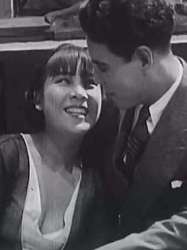
A Rosy Dream (1932)
, 1h23Directed by Cai Chusheng
Genres Drama, Romance
Actors Zheng Junli
Rating56%





Pink Dream tells the story of a young novelist who is supported by a loving and hard-working wife. The novelist, however, is drawn to the decadent life of a socialite who introduces him to the dance halls that dot Shanghai. As the film progresses, the novelist soon learns of the emptiness of this urban existence and rejects it as a "pink dream."
Scriptwriter

The Spring River Flows East (1947)
, 3h10Directed by Cai Chusheng, Zheng Junli
Genres Drama
Themes Political films
Actors Bai Yang, Shangguan Yunzhu, Wu Yin
Roles Writer
Rating72%





Part One is about 100 minutes in length. The film is set in Shanghai and begins shortly after the Mukden Incident of 1931. Sufen (Bai Yang) works in a textile factory; Zhang Zhongliang (Tao Jin) gives evening classes to the workers. During a National Day (October 10) celebration at the factory, Zhang successfully urges the workers to donate to the Northeastern Volunteer Army who are fighting the Japanese invaders in Manchuria. He is reprimanded by the factory's Manager Wen for going against the Japanese.

Song of the Fishermen (1934)
, 57minutesDirected by Cai Chusheng
Genres Drama
Actors Wang Renmei
Roles Writer
Rating63%





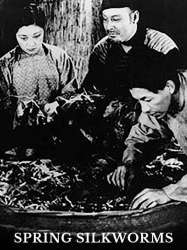
Spring Silkworms (1933)
, 1h36Genres Drama
Rating66%





The film tells the story of a family of poor silk farmers in Zhejiang province, who suffer hardship and deprivation when their crop of silkworm cocoons die off. The film criticizes not only the harsh market conditions that have forced the family into poverty, but the family's own superstitions and selfishness.

A Rosy Dream (1932)
, 1h23Directed by Cai Chusheng
Genres Drama, Romance
Actors Zheng Junli
Roles Writer
Rating56%





Pink Dream tells the story of a young novelist who is supported by a loving and hard-working wife. The novelist, however, is drawn to the decadent life of a socialite who introduces him to the dance halls that dot Shanghai. As the film progresses, the novelist soon learns of the emptiness of this urban existence and rejects it as a "pink dream."
 Connection
Connection

